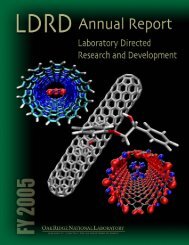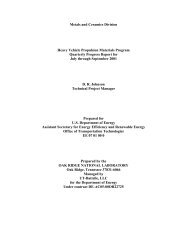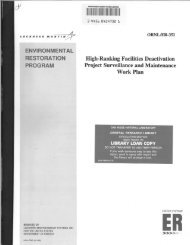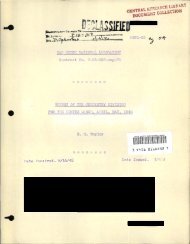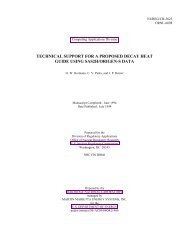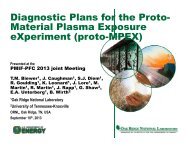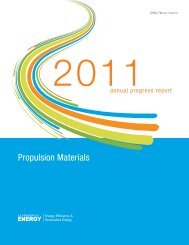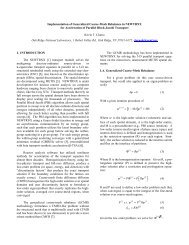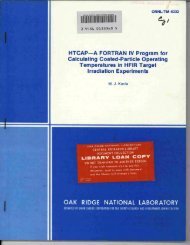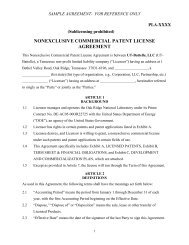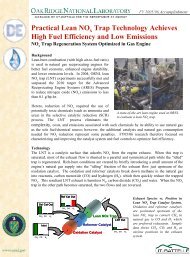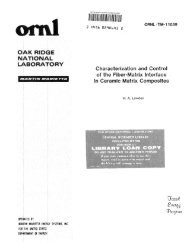FY2010 - Oak Ridge National Laboratory
FY2010 - Oak Ridge National Laboratory
FY2010 - Oak Ridge National Laboratory
Create successful ePaper yourself
Turn your PDF publications into a flip-book with our unique Google optimized e-Paper software.
Director’s R&D Fund—<br />
Understanding Climate Change Impact: Energy, Carbon, and Water<br />
UNDERSTANDING CLIMATE CHANGE IMPACT: ENERGY, CARBON,<br />
AND WATER<br />
05212<br />
Uncertainty Assessment and Reduction for Climate Extremes and<br />
Climate Change Impacts<br />
Auroop R. Ganguly, Marcia L. Branstetter, David J. Erickson III, Shih-Chieh Kao, Evan A Kodra,<br />
Esther S. Parish and Karsten J.K. Steinhaeuser, with Nitesh Chawla, Subimal Ghosh, Vipin Kumar,<br />
Michael Steinbach (all no-cost academic collaborators), and Pierre Ngnepieba (partner through<br />
HBCU Program)<br />
Project Description<br />
Climate extremes may be defined as severe hydrological or weather events, as well as large regional shifts<br />
in climate patterns, caused or exacerbated by climate change or variability. While an individual climate<br />
extreme may not be predictable, the statistical properties of certain types of extremes may be predictable<br />
with physics-based computational models of climate or sophisticated mathematical analysis. Thus,<br />
temperature extremes can be predicted with a relatively higher degree of certainty, while uncertainties<br />
dominate for hydrologic predictions. Extreme events like tropical storms, landslides, wildfires, and storm<br />
surge cannot be directly predicted by the current generation of climate models. However, projections of<br />
the statistical properties of extreme events and regional climate change, along with their uncertainties, are<br />
among the most critical inputs for climate change preparedness and mitigation. This project attempts to<br />
improve the science of climate extremes and uncertainty based on hypothesis-guided analysis and<br />
relatively hypothesis-free discovery processes.<br />
Mission Relevance<br />
The DOE Offices of Biological and Environmental Research and Advanced Scientific Computing<br />
Research have emphasized the importance of climate extremes, uncertainty, and their impacts through<br />
multiple strategic workshop reports and advisory board meetings focused on climate prediction,<br />
integrated assessments, and computational requirements. This author attended one such DOE-sponsored<br />
workshop entitled “Identifying Outstanding Grand Challenges in Climate Change Research: Guiding the<br />
Department of Energy Strategic Planning” in March 2008. The methods and insights developed here are<br />
important for multiple agencies such as the Department of Defense (DOD), <strong>National</strong> Oceanic and<br />
Atmospheric Administration (NOAA), Environmental Protection Agency (EPA), and <strong>National</strong><br />
Aeronautics and Space Administration. The DOD has already funded a synergistic activity through their<br />
Office of the Secretary of Defense (OSD), while multiple possibilities are currently at various stages with<br />
other federal agencies, including DOE.<br />
129



